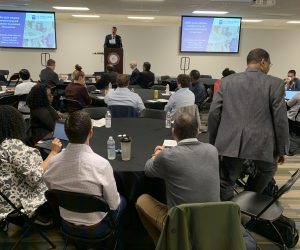 In recent years new and updated regulations, combined with an influx of new products, have raised compliance issues with submissions coming into the US Food and Drug Administration (FDA). At AOAC Southern California’s recent meeting December 4th and 5th, 2019 in Irvine California, the focus was on addressing these “Critical Regulatory and Compliance Issues with the US FDA in the 21st Century.”
In recent years new and updated regulations, combined with an influx of new products, have raised compliance issues with submissions coming into the US Food and Drug Administration (FDA). At AOAC Southern California’s recent meeting December 4th and 5th, 2019 in Irvine California, the focus was on addressing these “Critical Regulatory and Compliance Issues with the US FDA in the 21st Century.”
The meeting kicked off with a look at the FDA approvals process itself, which has evolved to a faster and more streamlined team-based review process. Keynote speaker Vilayat A. Sayeed explained how the new approach is being applied to reviews of drug, dietary supplement, and food products from domestic and international sources.
Another big-impact topic addressed at the meeting was growing concern about particulates in injectable drug products. “Particulates in injectables can lead to severe illness or even death,” noted Sumit Sen, Ph.D., president of AOAC Southern California Section. “We are glad the meeting was able to move this important issue forward at this critical time.” The presentation, by USP’s Principal Scientific Liaison Desmond Hunt, reviewed progress including new FDA regulations.
USP’s Matthew Vankoski also presented the current status of their work on monograph modernization. Over the last four years, USP has been working with the pharmacology industry on monograph modernization to keep abreast of innovation as new methods and technologies are introduced and others become outdated.
Ashok Bhagat of Par Pharmaceuticals in California took this theme further with a presentation of an industry perspective on the analytical method life cycle, reviewing his organization’s model for revisiting older methodologies to see if new improvements mean changes should be made.
“In any industry, a method that is 20 years old will need to be revisited as technology changes,” said Dr. Sen. “Being able to demonstrate you are managing the methodology lifecycle and improving methods on an ongoing basis provides enormous value.”
Several new technologies were introduced at the meeting, including a groundbreaking advancement in breast cancer detection and treatment with engineered peptides, shared by Kamaljit Kaur of Chapman University School of Pharmacy. Kwasi Antwi of Thermo Fisher Scientific presented an innovative technology using genome mass spectrometry in a multi-attribute method for critical quality attribute monitoring and new peak detection. This can be used on a broad range of products from food to dietary supplements, medical devices, cannabis, and other applications.